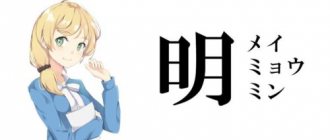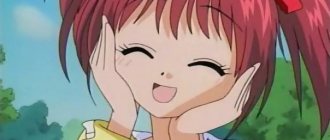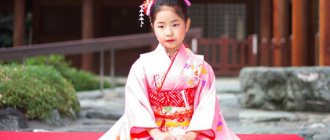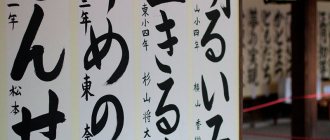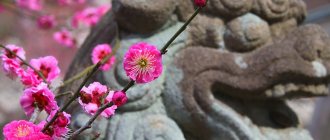Japanese names for men are quite difficult to both write and read. This is due to the fact that when parents name their child, they have the right to use a large number of hieroglyphs.
In addition, many names that are popular among Japanese have similar pronunciations and spellings, but have different meanings. It is quite difficult to fully understand all these features of the culture of the East.
Originally Japanese male names are very poetic and sonorous, for example, Mamoru, Noboru, Takumi, Fujita, etc. It is impossible to unambiguously translate them and give them a specific meaning.
However, nowadays modern Japanese are trying to make the life of their own descendants easier, so they give them simple names borrowed from Europe or America. They go quite well with Japanese surnames.
History of the origin of Japanese names
The way Japanese names originated has a connection with the beginning of the formation of the language of the Land of the Rising Sun. This happened three centuries BC. At that time, society was divided into ruling elites (clans), classes serving these clans, and slaves (the lowest class).
Due to certain components, the Japanese name could be used to determine the social position occupied by its owner. For example, if the name contained the “uji” component, this meant that its bearer belonged to the ruling elite.
The particle “be” spoke of the person’s belonging to the working class. Thus, a large number of genera were formed with names that were united by such components.
Over the years, the clan changed its status in society, and its names also changed. Today, the presence of the particles “uji” and “be” in the name speaks of its genealogical roots.
Now, by tradition, Japanese male names have several parts that combine both the first and last names. This practice is quite widespread in many Asian countries. Usually, when writing Japanese names, they use hieroglyphs, the pronunciation of which can change depending on the situation.
Currently, all Japanese have one surname and one given name, but no middle name. The exception to this rule are members of the emperor's family - they only have first names, no surnames.
Unlike Western countries, in Japan it is customary to say and write your own surnames and given names in reverse order. The last name is put first, and then the first name. Since names are usually created by the parents themselves, using existing hieroglyphs, there are a lot of them, much more than the more traditional surnames.
Male and female names have significant differences between themselves, expressed in the fact that characteristic components are used when composing each of them. It must be said that the most difficult thing in the Japanese language is reading names.
Japanese boy names starting with X
- Hachiro (八郎): Japanese means "eighth son"
- Hitoshi (等): Japanese for "balanced"
- Hideki (秀树): Japanese means "great opportunity"
- Hikaru (辉): Means "shine" in Japanese
- Hisao (寿夫): Japanese means "long-lived person"
- Hiro (1 - 裕, 2 - 寛, 3 - 浩): Japanese name – unisex, meaning 1) “many,” 2) “generous, tolerant,” or 3) “prosperous”
- Haruo (春男): Japanese for "spring man"
- Hisashi (久志): Japanese for "long-lived"
- Hideo (英夫): Japanese for "beautiful person"
- Hiroki (弘树): Japanese for "strength"
The influence of related cultures on the formation of Japanese male names
In the 7th century, a highly privileged samurai clan appeared in Japan. For several centuries it flourished and occupied the most important social position. It so happened that the samurai clan significantly influenced the system of formation of Japanese names.
The fact is that its representatives selected names depending on the circumstances, thus marking the most important life events. Samurai gave their names to slaves, who also changed them when they wanted. In most cases, servants were called by names that corresponded to a serial number.
For example, ICHIRO is the first son, SIRO is the third, GORO is the fifth. Many names for men that are still in use today have retained the "si" and "iti" components of sequential numbers.
However, today they usually indicate which son was born in the family in order - KYUICHI is the first-born, KENJI is the second.
Japanese boy names starting with T
- Takao (孝雄): Means "respected hero/man" in Japanese
- Takahiro (贵浩): Japanese for "noble"
- Tadao (忠夫): Japanese for "faithful person"
- Takumi (1 - 巧, 2 - 匠, 3 - 工): translated from Japanese means 1) "dexterous", 2) "craftsman", or 3) "skillful"
- Tamotsu (保): Japanese means "protector, patron"
- Taro (太郎): Japanese means "great son" or "eldest son"
- Toshio (俊夫): Japanese for "brilliant"
- Tadashi (1 - 忠, 2 - 正): translated from Japanese means 1) "loyal" or 2) "truth"
- Takashi (隆): Japanese means "commendable"
- Toru (彻): Japanese for "traveler"
- Toshi (慧): Japanese means "bright, intelligent"
- Takeshi (武): Japanese means "cruel, violent," "warrior"
- Takayuki (隆行): Japanese means "passing to heights"
Classification of Japanese male names
The names that boys are given in the Land of the Rising Sun are divided into two groups: single-component and multi-component.
The first ones consist of a verb, as a result of which the name has an ending. For example, Mamoru, which means protector or protect. Or the name consists of an adjective with the particle “si”. For example, Hitoshi is balanced. Sometimes there are names that are written with only one hieroglyph.
Multi-component Japanese names (those consisting of two characters) usually denote masculinity. For example, son, father, man, warlike, courageous, etc. All of them have their own ending. As a rule, such names contain a hieroglyph that suggests how the name can be read.
In addition, there are names that have three components. In this case, two of them indicate the masculine principle. For example, first son, eldest son, etc.
It is very rare in Japan to find men with a three-component name, in which only one component is an indicator of masculinity. Sometimes, but also very rarely, you can find names containing four components; they are usually written not in hieroglyphs, but in the Japanese alphabet.
Japanese boy names starting with K
- Katsuo (胜雄): Japanese for "child's victory"
- Kichirou (吉郎): Japanese for "lucky son"
- Katashi (坚): Japanese for "hardness"
- Kenshin (谦信): Japanese means "humble truth"
- Katsu (胜): Japanese for "victory"
- Katsumi (克己): Japanese for "discreet"
- Kazuo (1 - 和夫, 2 - 一男): translated from Japanese means 1) “harmonious person” or “first man”
- Kin (钦): Japanese name - unisex, meaning "gold"
- Kou (1 - 幸, 2 - 光, 3 - 康): 1) happiness, 2) light, or peace
- Kunio (国男): Japanese for "compatriot"
- Kyoshi (淳): Japanese for "pure"
- Kohaku (琥珀): Japanese name - unisex, meaning "amber"
Popularity and meanings of Japanese male names
Below is a list of names for boys that have been most popular among the Japanese in recent years. These are, of course, not all names in use, but the list below shows the most common names for men in Japan.
Popular Japanese names for men and their meanings:
Akarumei – bright glory; Aki – bright, autumn; Akio is a glorious hero; Akihiro – great fame; Anzen - unharmed; Atsushi – hardworking; Genkito – cheerful; Daiki - noble; Daichi – great wisdom; Jinushi – patron of agriculture; Yesaishu – fortress; Iwao – stone man; Ikiru – vital; Yoshito is a good person; Isamu – courage; Isao – worthy; Ishi – stone; Kagayashi – famous; Kajitsu – earthly fruit; Kazuo is a harmonious person; Kamizu - like God; Kamikoto - God's judgment; Kangen – flattering; Katsu – victory; Katsumi – reserved; Kin – gold; Kyoshi – pure; Kichirou is a happy son; Koketsu – noble; Kou – happiness, light; Kohaku – amber; Makoto – sincere, truthful; Mamoro – protector; Masaaki – true brightness; Masao is the right person; Masaru – victory; Masahiro – prosperous justice; Masashi – magnificent; Mattakushi – great; Minori – truth; Mitsuo is a brilliant person; Michi - path; Megumaro - blessed; Meosamashi - awake; Nao – respected, obedient; Nobuo is a loyal person; Nofu - plowing the land; Obu – royal; Okuma is a big bear; Raiden - thunder and lightning; Reidenshi – noble; Rikishi – competitive; Sadao is a determined person; Semei – prover; Serito – victorious; Serisha is the winner; Seshi – small; Seifuku - conqueror; Tadashi – loyal, truthful; Tayenoreschu - lord of the sun; Takao is a man, a respected hero; Takahiro – noble; Takeshi - warrior; Tamotsu – patron, protector; Taro – eldest son; Taske – assistant; Toshi – smart, bright; Toshiki – leading the fight; Hanawaro – crown, crown; Haruo is a spring person; Higashi - sunrise; Hideo is a wonderful person; Hikaro – light; Hikaru – radiance; Hiro – prosperous, generous; Hiroki – strength; Hisao is a long-lived person; Hitonoseri – victory of the people; Hitoshi – balanced; Heivanushi - ruler of the world; Tsuyoshi – healthy, strong; Tsutomu – worker; Shiavakuni is a happy country; Shizenreku - vital natural forces; Shishikyu - son of a lion; Shishio - lion; Shishihado is a solid lion; Eizoku – permanent; Yujiro – warlike, courageous; Yukio – brave, courageous; Yumainar – to become famous; Yutaka – rich; Yarite - creator; Yasuo is a healthy person; Yasushi – quiet, calm.
Japanese boy names starting with A
- Akio (1 - 昭雄, 2 - 昭夫): translated from Japanese means 1) "glorious hero" or 2) "glorious person"
- Akihiko (明彦): Japanese for "bright prince"
- Aki (1 - 秋, 2 - 明, 3 - 晶): translated from Japanese means: 1) “autumn” 2) “bright” 3) “spark”
- Arata (新): Japanese for "fresh"
- Akihiro (大畠): Japanese for "great glory"
- Atsushi (敦): Japanese means "hard worker"
- Akira (1 - 明, 2 - 亮): Japanese name – unisex, meaning 1) “bright” or 2) “clear”
Modern names
Since in the Land of the Rising Sun the choice of names is not limited by any framework, they are created from all the hieroglyphs that are allowed.
There are two or three of them. They mean something different in any given situation. This is the reason Japanese male names are so difficult to read. For example, Kungoro and Karou consist of the same character, but each of these names is read differently.
Time is rapidly moving forward, and modern trends have made certain changes in the formation of names. Today, among Japanese names for men, traditional ones continue to be popular, but they have developed various variations in reading.
Names that have become popular in recent years for men in the Land of the Rising Sun are: Sho, Tsubasa, Yamato, as well as various variations of the name Hiroto. Here are a few more modern male Japanese names with their meanings:
Akira is smart; Ajikito – benevolent; Dykes – big shine; Daisuke – great help; Isamu – cheerful; Ichiro is the first-born; Kaze – wind; Kazuki - hope for peace; Katsuo is a victorious child; Kenta – healthy, brave; Kiyoshi – quiet; Maryse - infinity; Naoki is a straight tree; Osamu – law-abiding; Roca – flowering reed; Ren – lotus; Ryu is a dragon; Sho - to take off; Sin – worthy; Sora – heaven; Susumu – progressive, successful; Takumi - artisan; Tsubasa – wing; Chikao – wise; Shogo – lucky; Yu - excellent; Yudai is a great hero; Yuto is an important person; Yamato is great.
In total, there are approximately 2,000 characters in Japan that people can use to name their child, guided by their own taste and wishes.
There are a myriad of names, but the Japanese simply do not know such a term as “namesake”.
Your comments
Find out the meaning of other names
Meaning of the male name Ivan Ivan is a fairly common Russian name. Bearers of this name can be both good boys and real bullies. Ivans always... The meaning of the male name Alexey... The name Alexey is quite well-known and widespread today. It is quite common among the stronger sex. Alexey named after them... Names of boys according to the church calendar... The birth of a child is the best gift for his parents. In this regard, mom and dad have pleasant worries. One of them is called... The secrets and meanings of male Chinese names... The Chinese state is developing more and more and introducing the world to its original culture. Everyone may know a student or exchange colleague... The meaning of the male name Miroslav... Miroslav is a name that fell out of use for some time, but is now gaining popularity with renewed vigor. A person who received from his parents...
Japanese boy names starting with M
- Minoru (里): Japanese for "truth"
- Makoto (诚): Japanese name - unisex, meaning "sincerity, truth"
- Masaru (胜): Japanese for "victory"
- Minori (里): Japanese for "truth"
- Manabu (学): Japanese means "to study"
- Mamoru (守): Means "protector" in Japanese
- Masahiko (正彦): Japanese for "just a prince"
- Masanori (正则): Japanese for "model of justice"
- Michi (道): Japanese for "path"
- Masao (正男): Japanese for "right person"
- Masashi (雅): Japanese means "elegant, magnificent"
- Masato (正人): Japanese for "right person"
- Masahiro (正洋): Japanese means "justice flourishes"
- Masaaki (真明): Japanese for "true brightness"
- Masumi (真澄): Japanese name - unisex, meaning "true clarity"
- Mitsuo (光子): Japanese for "brilliant person"
- Masaki (昌树): Japanese means "prosperous tree"
The most popular female names in anime
Anime girl names have wonderful meanings.
Below is a list of some anime names for girls with meanings derived from nature:
- Michiko : beautiful and wise child
- Momoe : one hundred blessings
- Haruhi : spring day
- Yuuki : snow
- Maiko : child of dance
- Maki : true hope
- Mariko : a real country girl
- Sakura : cherry blossoms
- Hikari : light
- Haruka : spring, sunny weather, flower or fragrance
- Shizuka : means calm, silence or flower.
- Himari : meaning of the sun
- Sora : sky
- Mami : true beauty
- Manami : meaning loving and beautiful
- Mao : cherry blossom dance
- Ichigo : strawberry
Here is a list of some more cute anime girl names:
- Akari : light or brightness
- Ayaka : bright flowers
- Kyouko : respectfully
- Emika : blessed beautiful child
- Ichika : thousand flowers
- Kanna : summer waves
- Asuka : perfume or scent of tomorrow
- Chiaki : sparkling light
- Asami : morning beauty
- Bashira : joyful and predictor of good news
- Ayane : wonderful
- Kiaria : lucky
- Misato : beautiful village girl
- Miyu : wonderful connection or kindness
- Rina : white jasmine
- Ichigo : strawberry
- Saika : colorful flower
